|
|
|
Sort Order |
|
|
|
Items / Page
|
|
|
|
|
|
|
| Srl | Item |
| 1 |
ID:
179228
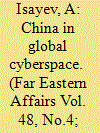

|
|
|
|
|
| Summary/Abstract |
The situation in cyberspace is now taking a very tense turn, due to the rivalry between the world largest economies for leadership in the digital environment. This paper analyzes the role and importance of China's strategy in the information environment and demonstrates the growing impact China has on the decision-making process in the digital environment in the international arena with regard to different technical issues and managing principles. We examine China's defense policy in this area, as well as the country's gradual transformation into one of the world's cyber superpowers capable of challenging American dominance on the Internet, which has already led to sharp confrontation and rivalry between China and the United States in today's information environment; to technological wars; to the development of arsenals of military viruses on both sides; and to the development of information war strategies and tactics.
|
|
|
|
|
|
|
|
|
|
|
|
|
|
|
|
| 2 |
ID:
154210
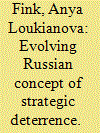

|
|
|
|
|
| Summary/Abstract |
Over the last decade, Russia has been putting into operation its vision of strategic deterrence, a doctrinal approach built on a demonstrated spectrum of capabilities and a resolve to use military force. Russia’s strategic deterrence is conceptually different from its Western namesake in that it is not limited to nuclear weapons.
|
|
|
|
|
|
|
|
|
|
|
|
|
|
|
|
| 3 |
ID:
186781
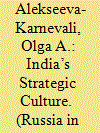

|
|
|
|
|
| Summary/Abstract |
India is emerging as a global power, but its strategic culture remains
largely understudied. Expert literature calls into question the very
existence of India’s own “systemic” strategic thinking. The article probes
into the validity of this viewpoint, postulates that India has its own
strategic culture, and highlights its key elements.
With the help of Michel Foucault’s genealogical method, the genealogy
of the concepts of ‘war’ and ‘power’ in Indian political philosophy is
examined and, on this basis, the central conceptual elements of India’s
military-political system are determined.
This approach shows that India’s strategic culture is distinguished not only
by its own systemic strategic thinking, but also by an original (different
from the Western one) way of structuring and coding the conceptual space
of ‘society,’ ‘politics,’ and ‘statehood.’ This gives an idea of how war and
strategy were understood in Indian culture in the past and how they are
seen today.
|
|
|
|
|
|
|
|
|
|
|
|
|
|
|
|
| 4 |
ID:
112228
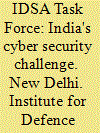

|
|
|
|
|
| Publication |
New Delhi, Institute for Defence Studies and Analyses, 2012.
|
| Description |
95p.
|
| Series |
IDSA Task Force Report
|
| Standard Number |
8186019987
|
|
|
|
|
|
|
|
|
|
|
|
Copies: C:2/I:0,R:0,Q:0
Circulation
| Accession# | Call# | Current Location | Status | Policy | Location |
| 056477 | 363.325054/IDS 056477 | Main | On Shelf | General | |
| 056478 | 363.325054/IDS 056478 | Main | On Shelf | General | |
|
|
|
|
| 5 |
ID:
115291
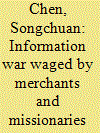

|
|
|
|
|
| Publication |
2012.
|
| Summary/Abstract |
This paper explores the efforts and impact of the Society for the Diffusion of Useful Knowledge in China (1834-1839), which existed during the five years before the First Opium War. It contends that the Society represented a third form of British engagement with the Chinese, alongside the diplomatic attempts of 1793 and 1816, and the military conflict of 1839-1842. The Society waged an 'information war' to penetrate the information barrier that the Qing had established to contain European trade and missions. The foreigners in Canton believed they were barred from further access to China because the Chinese had no information on the true character of the Europeans. Thus, they prepared 'intellectual artillery' in the form of Chinese language publications, especially on world geography, to distribute among the Chinese, in the hope that this effort would familiarize the Chinese with the science and art of Westerners and thereby cultivate respect and a welcoming atmosphere. The war metaphor was conceived, and the information war was waged, in the periphery of the British informal empire in Canton, but it contributed to the conceptualization of war against China, both in Canton and in Britain, in the years before actual military action. Behind the rhetoric of war and knowledge diffusion in Canton, lay a convergence of interests between merchants and missionaries, which drove both to employ information and military power to further their shared aim of opening China up for trade and proselytizing.
|
|
|
|
|
|
|
|
|
|
|
|
|
|
|
|
| 6 |
ID:
171666
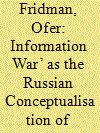

|
|
|
|
|
| Summary/Abstract |
The Kremlin employs a type of ‘strategic communications’, which, according to the Russian conceptualisation of information war, is a combination of military and non-military means intended to influence the information-psychological space of a targeted audience. Ofer Fridman argues that the Kremlin’s employment of economic counter-sanctions (non-military means) and its intervention in Syria (military means) demonstrate the Kremlin’s capability to participate in information war – the Russian counterpart of Western strategic communications.
|
|
|
|
|
|
|
|
|
|
|
|
|
|
|
|
| 7 |
ID:
169533
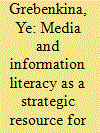

|
|
|
|
|
| Summary/Abstract |
TODAY'S DIPLOMACY is an extensive field that, in addition to professional diplomats, politicians and government officials, brings together public activists, science and culture figures, businesspeople, industrialists, information and communication technology (ICT) specialists, journalists, and many others.
|
|
|
|
|
|
|
|
|
|
|
|
|
|
|
|
| 8 |
ID:
009750
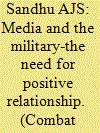

|
|
|
|
|
| Publication |
Dec 1995.
|
| Description |
47-54
|
|
|
|
|
|
|
|
|
|
|
|
|
|
|
|
| 9 |
ID:
161069
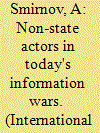

|
|
|
|
|
| Summary/Abstract |
RIVALRIES AND CONFRONTATIONS between states in the information space are a feature of today's international relations. Information is becoming one of the priority instruments in fighting for global domination.
|
|
|
|
|
|
|
|
|
|
|
|
|
|
|
|
| 10 |
ID:
155328
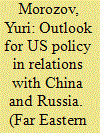

|
|
|
|
|
| Summary/Abstract |
Under President Donald Trump, the United States will continue to follow a policy of global hegemony under the slogan "America First," primarily to its own advantage. This applies to both Russo-American and Sino-American relations. At the same time, 100 days into his presidency, Trump had yet to fully devise a strategy for the foreign policy of the United States, which has been largely reacting to events in the international arena. This article describes the first results of the Trump administration's policy toward China and Russia, and the short-term outlook for US foreign policy strategy.
|
|
|
|
|
|
|
|
|
|
|
|
|
|
|
|
| 11 |
ID:
105611
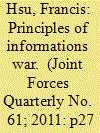

|
|
|
| 12 |
ID:
187777
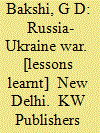

|
|
|
|
|
| Publication |
New Delhi, KW Publishers Pvt Ltd, 2023.
|
| Description |
xxxii, 272p.hbk
|
| Standard Number |
9789394915152
|
|
|
|
|
|
|
|
|
|
|
|
Copies: C:1/I:1,R:0,Q:0
Circulation
| Accession# | Call# | Current Location | Status | Policy | Location | IssuedTo | DueOn |
| 060242 | 947.7086/BAK 060242 | Main | Issued | General | | A1671 | 27-Apr-2024 |
|
|
|
|
| 13 |
ID:
062251
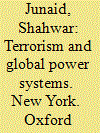

|
|
|
|
|
| Publication |
New York, Oxford University Press, 2005.
|
| Description |
228p.
|
| Standard Number |
0195977882
|
|
|
|
|
|
|
|
|
|
|
|
Copies: C:1/I:0,R:0,Q:0
Circulation
| Accession# | Call# | Current Location | Status | Policy | Location |
| 049700 | 303.625/JUN 049700 | Main | On Shelf | General | |
|
|
|
|
| 14 |
ID:
189208
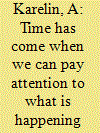

|
|
|
|
|
| Summary/Abstract |
Armen Oganesyan, Editor-in-Chief of International Affairs: Alexander Alexandrovich [Karelin], you are an experienced politician, a founding member of the United Russia party, and have extensive legislative experience. What do you believe needs to be done first of all in our new reality?
|
|
|
|
|
|
|
|
|
|
|
|
|
|
|
|
| 15 |
ID:
155279
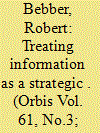

|
|
|
|
|
| Summary/Abstract |
The United States is challenged by adversaries who seek to alter fundamentally the systemic balance of power through information-based strategies. These strategies leverage both legal and illegal operations to gain influence and control over key industries and information resource domains to constrain American freedom of action. It is a larger geoeconomic and geoinformational campaign by adversaries to harvest information in support of military, diplomatic, economic, and global political goals. To respond, the U.S. government must understand that information is a strategic resource. An American response might be to erode its competitors’ economic and informational advantages, attack their dependencies on other strategic resources, and exploit their information control systems. Cyberspace operations may provide some competitive advantage, but first they must be employed effectively. This effectiveness requires overcoming debilitating intellectual constraints and adopting new operational models.
|
|
|
|
|
|
|
|
|
|
|
|
|
|
|
|
| 16 |
ID:
012512
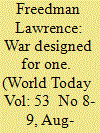

|
|
|
|
|
| Publication |
Aug-Sept.1997.
|
| Description |
217-23
|
|
|
|
|
|
|
|
|
|
|
|
|
|
|
|
|
|
|
|
|